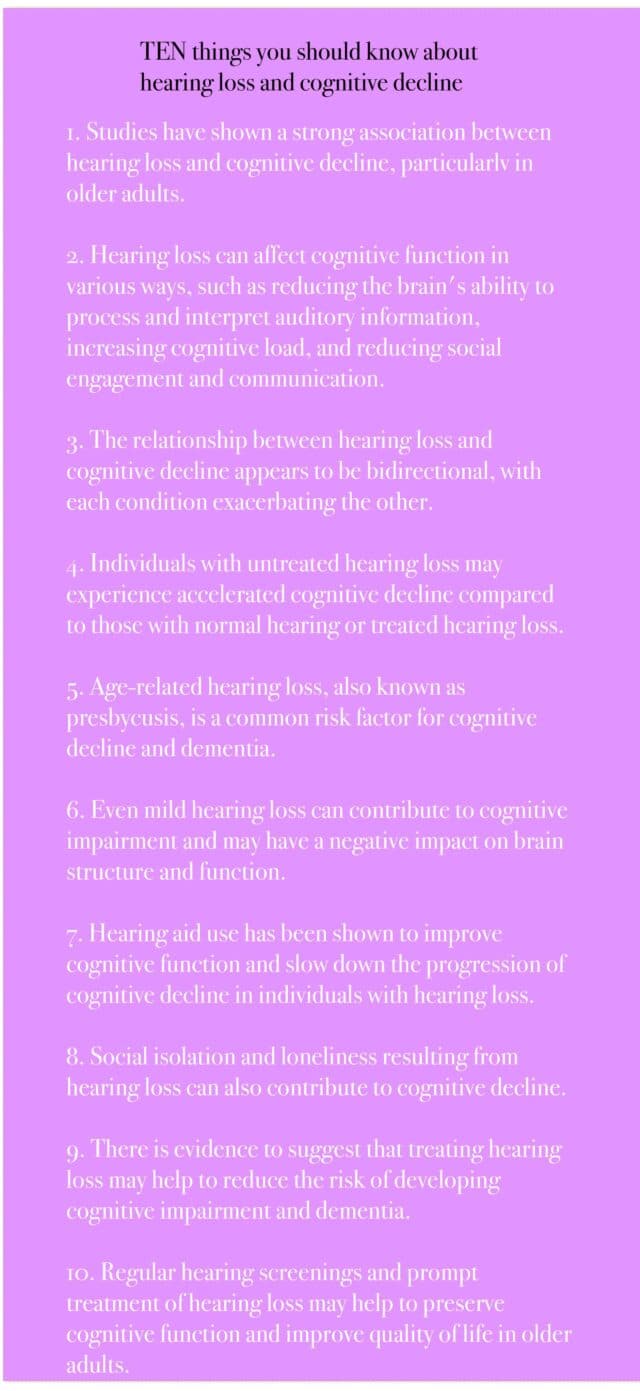THE COGNITION,AUDITION, AND AMPLIFICATION CONUNDRUM


And to back up the statements in the list above, please refer to:
A recent study by Maharani et al. (2021) conducted a systematic review and meta-analysis of 36 studies and found a significant association between hearing loss and cognitive decline in middle-aged and older adults. Lin et al. (2011) conducted a meta-analysis of 40 studies and found a significant association between hearing loss and cognitive decline, particularly in older adults.
An article by Livingston et al. (2021) proposed that hearing loss may contribute to cognitive decline by increasing cognitive load, reducing sensory input, and impairing social engagement.
A longitudinal study by Dawes et al. (2021) found that hearing loss and cognitive decline were bidirectionally associated over a 25-year period.
A recent study by Zhan et al. (2021) found that older adults with untreated hearing loss had a higher risk of cognitive impairment and dementia compared to those with treated hearing loss or normal hearing.
A study by Amieva et al. (2015) found that individuals with untreated hearing loss had a higher risk of cognitive decline and dementia compared to those with normal hearing or treated hearing loss.
A systematic review and meta-analysis by Wolters et al. (2020) found that age-related hearing loss was a significant risk factor for cognitive decline and dementia, independent of other factors such as age, sex, and education.
A recent study by Gallacher et al. (2020) found that even mild hearing loss was associated with increased risk of cognitive decline and dementia over a 20-year period.
An intervention study by Ferguson et al. (2020) found that hearing aid use improved cognitive function and quality of life in older adults with hearing loss.
An intervention study by Amieva et al. (2018) found that hearing aid use improved cognitive function and slowed down the progression of coqnitive decline in older adults with hearing loss.
A recent study by Duggal et al. (2021) found that social isolation resulting from hearing loss was associated with increased risk of cognitive decline and dementia in older adults.
A systematic review and meta-analysis by Loughrey et al. (2021) found that treating hearing loss may help to slow down the progression of cognitive decline in older adults.
A study by Deal et al. (2021) found that regular hearing screenings and early intervention for hearing loss may help to prevent or delay cognitive decline in middle-aged and older adults.
Equally, a study by Lin et al. (2013) found that regular hearing screenings and prompt treatment of hearing loss may help to preserve cognitive function and improve quality of life in older adults.
If the patient presents to the GP and reports listening difficulties, these screenings should lead to a referral for further audiological investigations, irrespective of the outcome of the screening, to rule out suprathreshold disorders, as well as referrals to other associated specialties.
Source: Audiology News UK issue 01 March-April 2023
